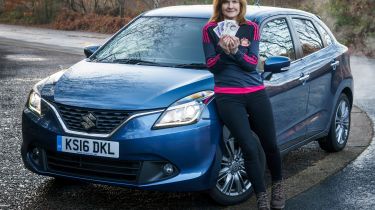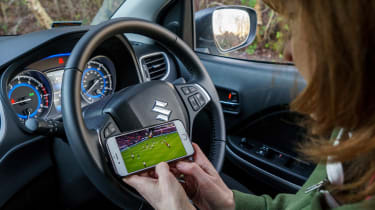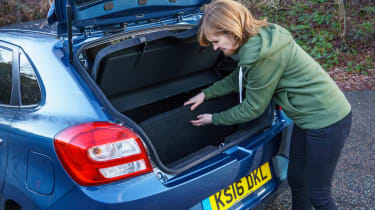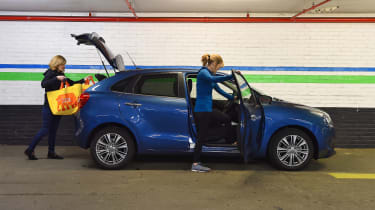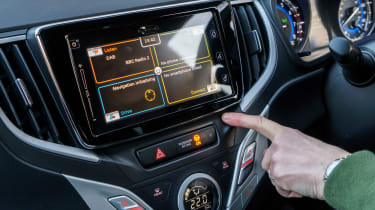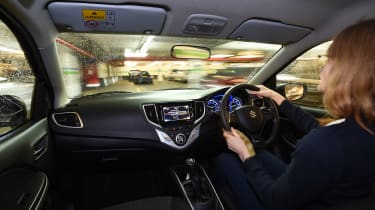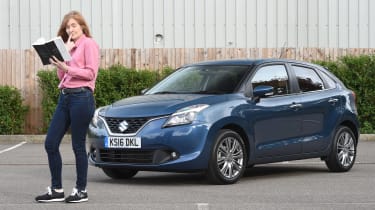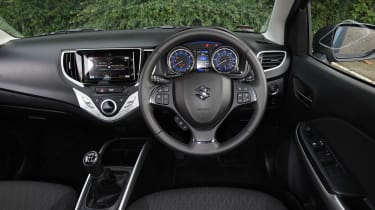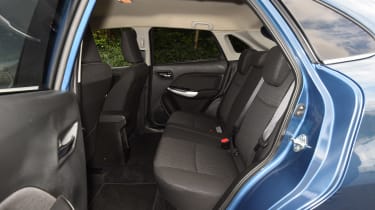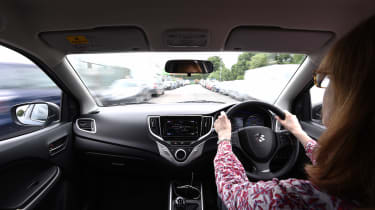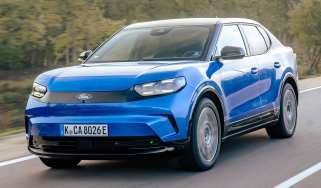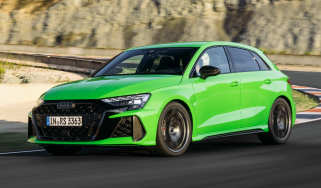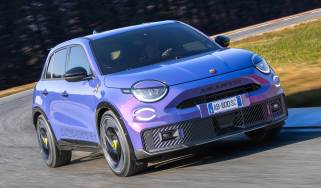Long-term test review: Suzuki Baleno
Fourth report: savings add up for our spacious supermini
It might be a little bland, but the savings the Baleno offers when buying on finance are tasty. While the Suzuki is cheap and cheerful, it still offers a great level of kit and practicality for the price alone. Once again, I'm impressed.
Mileage: 4,752
Economy: 42.4mpg
It's funny how you interact with a car. Some you love, some you dislike, some you tolerate, and some – like my Suzuki Baleno – become part of the family.
The Suzuki has slipped into day-to-day life in the Grant household quite nicely. Our household loves football – and it seems the supermini does, too. Allow me to explain.
Buy the Baleno on finance, and with an affordable £1,500 deposit, the keenly priced £13,749 SZ5 model we’re running could be on your drive for a reasonable £216 per month. That includes a £750 discount from Suzuki as long as you register your car by the end of March. And it’s not all that much given the practicality and kit the car offers, so it’s no surprise it was commended in the supermini class at our 2016 New Car Awards ceremony.
Such low bills really appeal in these days of spiralling costs for football fans – something I’m all too aware of because most of my family are mad about the beautiful game. Put down the same amount on a Volkswagen Polo (our reigning Best Supermini) over the same three-year deal limited to 10,000 miles per year, and you’ll pay £271 per month. That’s for a Polo SEL five-door with a similar spec to our SZ5 and powered by a 108bhp 1.0-litre TSI petrol engine – more or less equivalent to the Suzuki’s 109bhp 1.0 turbo. So anyone running the Baleno will make a saving of £55 per month over the VW deal.
More reviews
Car group tests
In-depth reviews
Road tests
Used car tests
The money I’d save buying the Suzuki on a Personal Contract Purchase over the Polo would cover my Sky Sports TV subscription, so I can carry on tuning in to my beloved Sunderland AFC, while other members of the family can enjoy Arsenal and Chelsea games. Even then, I’d have money left over to watch my team in the flesh when they’re playing away near my south-west London home.
Not that you have to spend the cash on football. I’m also a member of my local gym, which doesn’t come cheap, and the savings over the Polo would come in handy here. But low running costs aren’t the only reason for me warming to the Baleno. I’ve made lots of trips to and from Heathrow to pick up and drop off my daughter on her visits home from Spain. At Christmas I collected her and a friend with all their luggage.
They were carrying a couple of suitcases apiece, but the Suzuki swallowed the lot easily thanks to its 320-litre boot. Had I turned up in a Polo, with its 280-litre capacity, we’d have had suitcases spilling on to the back seats.
A few longer journeys like this heading out of town have helped improve the fuel economy from around 36mpg in my last report (Issue 1,448) to closer to the 45mpg we’d expect. Plus, no matter where it’s being driven, the Baleno continues to impress with its engaging handling and plentiful grip.
Third report
Suzuki Baleno supermini is proving practical and punchy
Mileage: 3,725Economy: 36.5mpg
Apart from a couple of trips down the M4 to pick up and drop off my daughter at Heathrow, my Suzuki Baleno has recently spent most of its time around the outskirts of London – and it’s certainly made me appreciate the blend of qualities that Suzuki has injected into the car.
The Baleno was designed to offer more practicality than the firm’s smaller Swift, delivering extra space while still keeping the package compact and ideal for town living.
The 320-litre boot is spacious for a car in this class, too, and clearly defines the Baleno as Suzuki’s more versatile supermini offering, next to the 211-litre Swift. So the brand has achieved its goal, but has also married this with an engaging driving experience, which bodes well, given the next Swift will use the same 1.0-litre turbo engine.
As I said in my last report, the little three-cylinder unit is great, but that’s not the whole story. The ride is comfortable and the steering sweet for such a small, cheap car, while the grip the chassis delivers gives a reassuring feeling.
Plenty of urban driving has taken its toll on the fuel economy, however, with the Baleno averaging only 36.5mpg over the last tank. It could be helped by a stop/start system – something that is missing from the 1.0 Boosterjet, but that’s included on the 1.2 Dualjet mild hybrid. It’s an unusual omission, especially in a modern supermini that’ll spend plenty of time around town.
There are no parking sensors, either, although the standard-fit seven-inch screen on our SZ5 model gives a clear image from the reversing camera, which makes parking in confined spaces straightforward. Maybe too straightforward, as it’s not all been positive for the Baleno of late: the car has unfortunately gained a battle scar.
My gym car park is a dangerous combination of narrow spaces, but easy to manoeuvre into thanks to the rear-view camera. After a recent workout, I returned to find a dent on the front passenger door, presumably from another car door being opened too aggressively.
Now the clocks have gone back, the shorter winter days have also highlighted that only the central interior light comes on when you open the doors and not the two at the front. It’s not a major issue, as they work manually and provide plenty of illumination, but it’s a bit fiddly, and you just have to remember to switch them off.
The touch-sensitive slider for the volume control on the infotainment system is also awkward to use, especially on the move, but at least there are steering wheel-mounted controls to get around this.
Suzuki Baleno: second report
Suzuki Baleno hatch has taught us not to judge a book by its cover
Mileage: 3,608Economy: 47.3mpg
Life with the Suzuki Baleno has been busy, and it’s already proven itself to be a more practical supermini than its smaller Suzuki Swift sibling. But one thing that’s gone relatively unnoticed is the engine.
The downsized 1.0-litre three-cylinder turbocharged petrol engine is a real highlight, and has reminded me that while the Baleno might look a bit bland in our car’s £430 Ray Blue metallic paint, you should never judge a book by its cover.
The little triple produces 109bhp, so it’s on par with other compact hatchbacks when it comes to power, or even slightly ahead. However, whereas the likes of the naturally aspirated 1.2 in the Honda Jazz might struggle to uproot a sapling, it feels like the Baleno’s brawnier engine could topple a tree.
It’s all relative, of course, but I’ve found that around town the Suzuki’s 170Nm of torque means you don’t have to change gear quite as often as in some rivals. It makes for more relaxed progress, as the engine can easily pull taller gears in slow-moving city traffic without any nasty vibrations, offering good performance at low revs.
Being able to access a lot of that performance while keeping the revs down has helped fuel economy, too. When I first got the car it was averaging just under 40mpg, but now my calculations show it recorded 47.3mpg on its last tank of fuel. My driving style and journeys haven’t changed over that time, either, so while traffic might account for a little variation, the Suzuki’s fuel-sipping engine is delivering the goods.
The thrummy three-cylinder also makes the car fun to drive, as it’s keen to be revved before revealing a little more of its character as it works nicely with the steering and chassis. But the Baleno has a few unusual traits I’ve noticed over the last few months. While there’s enough grip to make you feel safe and secure through corners, on the motorway the car is affected by winds and gets buffeted around. It’s slightly unnerving and probably down to the light kerbweight.
And while safety aids such as autonomous braking and adaptive cruise offer peace of mind, the collision warning alert is irritating. I’ve already mentioned how sensitive it is to the point where I prefer to switch it off rather than have it beeping at me aggressively. But it’s also been a little inconsistent recently. The buzzer has gone off in stationary traffic, while it’s not sounded when someone’s pulled out on me.
• Suzuki Baleno mild hybrid review
Everyone who has driven the Baleno has said how frustrating it is, like it’s balanced on a hair trigger. I’ll be keeping my eye on it to see if any more glitches appear.
Suzuki Baleno: first report
Suzuki Baleno supermini joins our fleet, and its kit makes a big impression
Mileage: 1,455Economy: 52.3mpg
The new Suzuki Baleno has made a big impact since debuting earlier this year, winning an Auto Express road test and a commendation in our 2016 New Car Awards. So when I found out the Japanese supermini was joining our fleet, I made a beeling to JEM Suzuki in Hendon, North West London, where our new arrival was waiting.
• New Car Awards 2016: The winners
I received a warm welcome from sales consultant Simon Phillipson and his team, and after a quick cup of coffee, the car was brought around the front. Here Simon gave me a guided tour of our 1.0 Boosterjet model in range-topping SZ5 trim. This took rather longer than expected, because despite its modest £13,999 price, the Baleno comes with the sort of kit that would shame a premium-brand executive saloon.
Firstly, I was talked through the standard sat-nav and touchscreen infotainment system. It's similar to the one in the Vitara we used to run, but Simon showed me some things to make it more user friendly.
• Suzuki Vitara long-term test
This included allowing the navigation system to work when you are moving, so your passenger can be punching in the postcode without you having to pull over.
Syncing my phone with the Bluetooth system was simple, but he also guided me through the Apple CarPlay function - a real bonus on a budget car. Plug in your iPhone and the familiar Apple interface appears on the seven-inch colour screen. I look forward to trying out the added functionality.
Another part of the Baleno's extensive standard safety kit is a collision alert system, which I've already found can be irritatingly sensitive, especially when around town.
More high-tech safety additions include adaptive cruise control - a clever piece of kit that's virtually unheard of on a car of this size and price. Like the collision alert, you can alter the the distance at which the system responds, this time by using the handily placed steering-wheel rocker switch.
Elsewhere, Simon pointed out the climate control, keyless entry and 4.2-inch trip computer screen, plus the High Intensity Discharge headlamps, 16-inch alloys and the rear privacy glass outside.
Under the bonnet is Suzuki's new turbocharged 1.0-litre three-cylinder Boosterjet petrol engine, which follows the current trend for downsizing. Yet even on my short trip across London from the dealer to my home, I was impressed by the little unit's punchy delivery and refinement. The Baleno also took bumps and potholes in its stride, while the light and accurate steering made easy work of the crowded city streets.
The interior is surprisingly roomy, too, and while some of the plastics feel a little low rent, everything is robustly screwed together. Besides, at this price, it's splitting hairs to complain about cheap materials.
So the early signs are good for the spacious, well equipped and comfortable Baleno. I look forward to seeing how long its showroom shine endures.
*Insurance quote from AA (0800 107 0680) for a 42-year-old in Banbury, Oxon, with three points.

